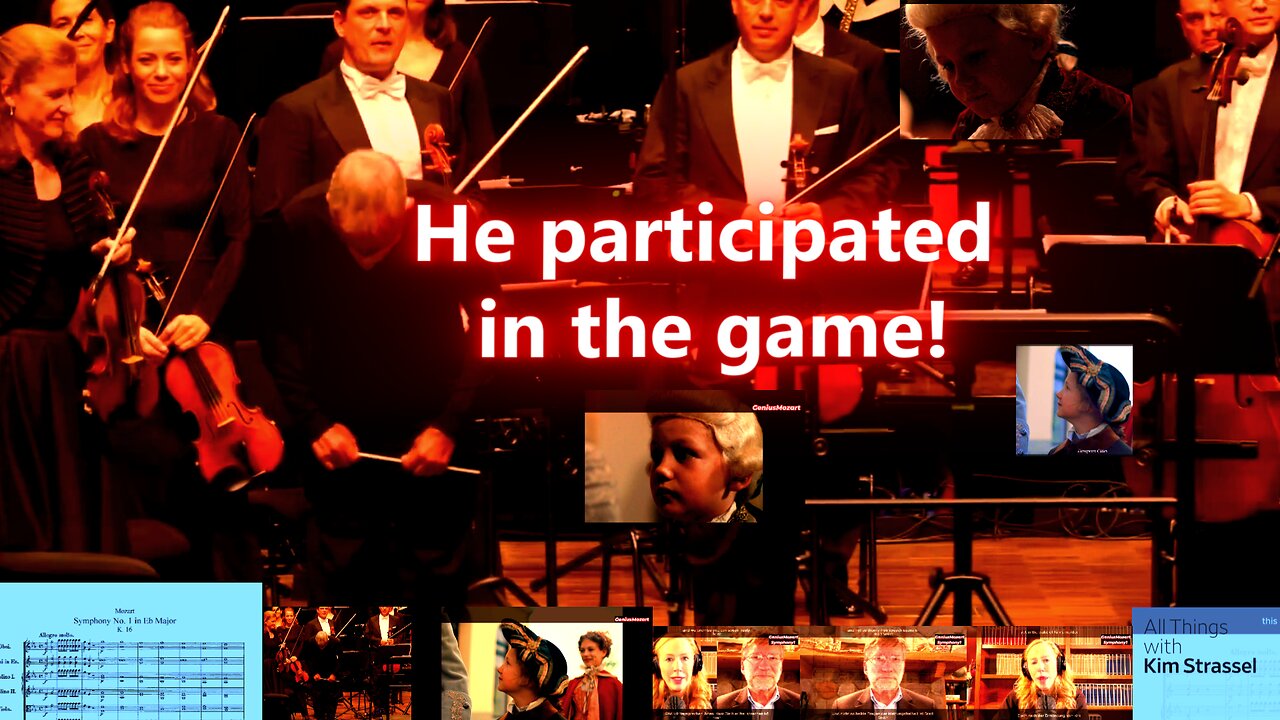Premium Only Content

Free Speech, B.Smith . The prodigy with a blindfold, W.Mozart
Kim Strassel is stirring things up with her podcast "All Things," where she discusses threats to freedom of speech. Attorney General Pam Bondi wants to punish "hate speech," FCC Commissioner Brendan Carr is threatening ABC over Jimmy Kimmel – and the nation is stumbling into the age-old question: How free is speech, really?
Amidst legal intricacies and Brad Smith's (Institute for Free Speech) sober analysis, the sounds of Mozart's music keep recurring – as a counterpoint, as a reminder that freedom also needs music, not just legal statutes.
For the finale: the conductor takes another bow, applause, and then our excerpt from the documentary "Genius Mozart – The Liberation." Here, Mozart is shown not only as a child prodigy, but also as a young rebel who leaves Salzburg to forge his own path – free from his father's control, from courtly constraints, in search of genuine recognition.
And so the circle closes: from the question of free speech today to the musical freedom of the 18th century – a playful dialogue about courage, individuality, and what truly sets us free.
--
The famous "child prodigy with a blindfold" story! 🎹🐱
The scene of young Mozart (aged 8) playing blindfolded or with covered keys at the English court (in London in 1764/65) isn't a modern film gag, but rather stems from contemporary accounts:
The English chronicler Daines Barrington reported in 1769 in the Philosophical Transactions of the Royal Society that Mozart was tested in London "with a cloth over his hands" or "with covered keys" to test his abilities.
The German Mozart biographer Friedrich Schlichtegroll (1793) also included the anecdote.
The part about the cat is probably embellishment, added in later depictions (plays, novels, films) – contemporary sources don't mention it. In short:
✅ The test at court – genuine, documented multiple times.
❌ The cat – more of a poetic license.
So, Mozart really did play "blindfolded" to prove he wasn't cheating – but Hollywood and others later embellished the story with some feline fluff.
🎹✨ Here's a short list of the best anecdotes about the child prodigy Wolfgang Amadeus Mozart (most historically documented, some with a touch of legend):
1. London (1764/65) – The "blind test" at the court of George III
Mozart, then only 8 years old, was tested in front of the royal family.
He was asked to play a piece from sheet music, improvise – and even play "blindfolded," with a cloth over his hands or the keyboard.
Reports say he passed all tests brilliantly.
2. Paris (1763/64) – The Queen as teacher
Mozart performed for Marie Leszczyńska, the wife of King Louis XV.
She had him sit on her lap and supposedly asked him playful music questions, which he answered immediately.
3. Vienna (1762) – "On the Empress's lap"
At 6 years old, he performed for Empress Maria Theresa at Schönbrunn Palace.
Legend has it that after his performance, he jumped up, climbed onto the Empress's lap, and kissed her.
The young Archduchess Marie Antoinette (later Queen of France) was also present – Mozart supposedly asked her to marry him when she helped him after he slipped and fell.
4. Munich (1763) – The mini-composer
The Elector of Bavaria had him tested.
When asked if he could compose, Mozart scribbled down a short minuet.
The music director initially doubted him – until Wolfgang immediately played the piece from sheet music. 5. The Netherlands (1765/66) – Mozart with a Fever
During a concert tour, he fell seriously ill (typhus or scarlet fever).
Despite the fever, he reportedly resumed playing immediately after recovering – supposedly better than ever before.
6. Italy (1770) – Vatican: "Miserere" Notated from Memory
In the Sistine Chapel, 14-year-old Mozart heard Allegri's strictly secret "Miserere," which was never to be published.
He later wrote it down from memory – almost flawlessly.
The Pope wasn't angry; in fact, he awarded him the Order of the Golden Spur.
7. Salzburg (1760s) – Improvisation Prodigy
Eyewitnesses report: You could sing or write down a theme for Mozart – and he would immediately improvise a fugue or variations.
This particularly amazed the older court musicians, who often tried to tease him.
8. The "Legendary Layer" – Mozart and the Cat 🐱
In later plays and films, the scene appears where Mozart would let a cat walk across the keyboard while playing, or imitate its meowing.
Historically uncertain – but it fits the image of the mischievous genius.
👉 Conclusion: Even as a child, Mozart was a "performance phenomenon," showcased throughout Europe like a circus act. Many anecdotes are well documented, while others have been embellished over the centuries – making him seem even more mysterious.
-
Regarding point 6,
the story behind it:
🎶 Why was Allegri's Miserere "forbidden"?
The work was composed around 1630 and was intended exclusively for the Sistine Chapel...composed for the Sistine Chapel in the Vatican.
It was traditionally sung only during Holy Week (Maundy Thursday and Good Friday) in the Tenebrae liturgy.
The Vatican declared the piece "classified":
Copying or performing it outside of Rome was strictly forbidden.
Anyone who did so risked excommunication.
Reason: The music was part of the special aura of the papal liturgy – the Vatican's "exclusive soundtrack," so to speak.
🎹 Mozart and the coup
In 1770, the 14-year-old Mozart heard the piece during his stay in Rome.
After hearing it only once, he wrote it down from memory – and corrected minor errors a few days later after a second performance.
With this, he effectively broke the Vatican's monopoly.
⛪ The Pope's reaction
Surprise: Instead of punishing him, Pope Clement XIV honored him!
He awarded Mozart the Order of the Golden Spur (a kind of papal knighthood).
The Pope was apparently so impressed that he relaxed the restrictions – from then on, the work was no longer "classified."
🤯 Today
The "Miserere" is now freely available and is considered one of the most beautiful a cappella compositions in sacred music.
It is famous for its high soprano line (almost otherworldly, a kind of "vocal highlight" of the Baroque era).
Today: One click on YouTube – and you can hear it in the best quality. The irony of history. 😅
-
 36:28
36:28
TruthStream with Joe and Scott
1 day agoMark Attwood joins TruthStream in Ireland!
4.87K30 -
 2:13:30
2:13:30
Side Scrollers Podcast
1 day agoUK Introduces MANDATORY Digital ID + Dallas ICE Shooting BLAMED on Gaming + More | Side Scrollers
189K49 -
 LIVE
LIVE
Lofi Girl
2 years agoSynthwave Radio 🌌 - beats to chill/game to
136 watching -
 2:26:44
2:26:44
Tundra Tactical
6 hours ago $9.97 earned🎉 Pro-2A Party LIVE! | Zeke Stout Joins The Show With Tacoma Tactical
15.5K -
 2:36:47
2:36:47
BlackDiamondGunsandGear
8 hours agoAFTER HOURS ARMORY / The LEFT are Recruiting / Join the Leftist Gun Club?
7.13K6 -
 16:07
16:07
Ken LaCorte: Elephants in Rooms
12 hours ago $2.84 earnedWhy firefighting got political
12.6K3 -
 8:31
8:31
Rethinking the Dollar
17 hours agoBitcoin Secrets Nobody Talks About!
7.51K5 -
 2:36:47
2:36:47
DLDAfterDark
6 hours ago $2.71 earnedIs The Left Recruiting To KILL Conservatives? Hey Fascist, CATCH!
9.94K1 -
 22:53
22:53
Jasmin Laine
1 day agoParliament ERUPTS After "WORST Decision EVER!"—Carney Left SPEECHLESS by SHOCKING Report
36.2K79 -
 11:50
11:50
Mrgunsngear
1 day ago $10.86 earnedSteiner MPS Enclosed Red Dot: Better Than The ACRO P2? 🔴
38.7K18